
Back in October, Italy's politicians passed a new electoral law, the piece of legislation that made elections possible.
But not everyone was happy, with the Five Star Movement (M5S) arguing that new rules put them at a disadvantage. They held a protest at Rome's Pantheon wearing blindfolds to show how they felt the law affected them. Pictured are party founder Beppe Grillo and Alessandro Di Battista. Photo: Andreas Solaro/AFP

Current prime minister Paolo Gentiloni is pictured delivering his end of the year speech on December 28th, before dissolving parliament.
Though seen by many as a 'caretaker PM' when first appointed in late 2016, Gentiloni has spent longer in office than many an Italian prime minister, and may hold onto the job even longer — an outcome that would please many Italians, since the Democratic Party (PD) politician is regularly ranked as Italy's most popular. Photo: Alberto Pizzoli/AFP

After the dissolution of parliament, it was time for the campaign to start. Here's an M5S supporter holding a poster with a rather disturbing image showing Matteo Renzi and Silvio Berlusconi's faces morphed into one. Photo: Andreas Solaro/AFP

PD leader Matteo Renzi boared a train saying 'Destination Italy' as he kicked off his campaign back in October. Renzi, once known as 'the scrapper' due to his ambition and sweeping reforms, has been relatively quiet through a campaign dominated by the vocal rightwing. Photo: AFP

This image of Matteo Salvini speaking at a League (formerly Northern League) rally sums up the party's rhetoric. The slogan 'prima gli Italiani' (Italians first) echoes US President Donald Trump. The party also dropped the word ‘north' from their official logo in late December, which features the word ‘Lega' (League) and the new slogan ‘Salvini premier'. Salvini has made no secret of his desire to take the top job, something coalition ally Silvio Berlusconi has repeatedly said will not happen. Photo: Miguel Medina/AFP

The Five Star Movement campaigns on an anti-corruption platform and has had its fair share of embarrassments during the campain, including accusations of plagiarizing its election programme from Wikipedia and rival politicians' speeches, and three of its canddiates being kicked out of the party over links to Freemasonry.
But the biggest scandal was the revelation that its members may have pocketed over €1 million which the party had promised to donate to a small business fund. In the picture above, Di Maio is shown taking a closer look at the paperwork with the crew of TV show Le Iene, which revealed the missing million. Photo: Luigi Di Maio/Facebook

Unlike many European countries, Italy doesn't host official TV debates between the party leaders, but there have been a few, often bizarre, discussions between different party leaders, both on Facebook Live and TV shows. The screengrab above is from La7, where Salvini and President of the Lower House Laura Boldrini took part in a surreal meeting, each holding up pieces of paper with hashtags written on them while the other spoke.
.jpg)
Immigration has been one of the most discussed issues of the election, with Berlusconi's coalition calling for a stop to immigration and the deportation of hundreds of thousands of migrants already in the country.
Anti-migrant group CasaPound, which has neofascist roots, has held rallies across the country, many of which have been met with counter-protests from anti-fascist protesters. A minority of the protests on both sides have turned violent, with dozens of arrests.
Pictured above is a CasaPound rally outside Rome's Pantheon. Photo: AFP

A lot of the campaign coverage focussed on the men leading the country's major parties, but there are several women set to play an important part in Sunday's vote. Above is lawyer and acid attack survivor Lucia Annibali, who will run for the first time as a PD candidate. Photo: Andreas Solaro/AFP
Volevo ringraziare di cuore da parte di un uomo qualunque Gianluca Vassalo per l'iniziativa #VotaPerMe.
We are all humans. pic.twitter.com/jZ1L3hbpxA— Diego Minin (@diego_minin) February 13, 2018
Immigration was one of the most-discussed issues ahead of the election. In these posters, the slogan 'vote for me' accompanied pictures of migrants living and working in Sicily.

Silvio Berlusconi portrays himself as the caring 'nonno' of Italy, and his grandfatherly instinct was on display at a coalition rally where he wiped the forehead of junior ally Salvini. Photo: Andreas Solaro/AFP

The leaders of the centre-right coalition pictured on March 1st — one of the only times they were all together during the entire campaign. A campaign tactic to visit as much of Italy as possible between them, or a sign of rifts within the bloc? It's hard to know for sure. Photo: Alberto Pizzoli/AFP



 Please whitelist us to continue reading.
Please whitelist us to continue reading.